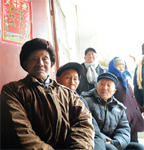Chinese Communists have had an uneasy relationship with both the Catholic and Protestant faiths. But that is now changing as, against a backdrop of an ageing population and a distrust of secular charities, they welcome an expansion of the Churches’ provision of social care
By 2040, according to the Chinese Academy of Social Sciences, nearly 20 per cent of China’s rural population will be over 65. And being aged over 65 in China’s rural heartland is a very different prospect from being the same age in the United Kingdom. Earlier this year, I met a family of eight living in two adjoining houses in a village in central China. They are fruit farmers, growing apples, peaches and pears in beautiful orchards. They are up at 5 a.m. each day, grabbing a quick bite to eat before
21 November 2013, The Tablet
China’s Churches in from the cold
Christianity and social care
Get Instant Access
Continue Reading
Register for free to read this article in full
Subscribe for unlimited access
From just £30 quarterly
Complete access to all Tablet website content including all premium content.
The full weekly edition in print and digital including our 179 years archive.
PDF version to view on iPad, iPhone or computer.
Already a subscriber? Login





User Comments (1)
The question of massive human movements is not new. It is as old as the hills, only that we know it more because of the fastness of news and images in this era of information. Why are we so surprised by these human massive movements? Let us put a few things in perspective: Think of the history of imperialism, colonialism, slave trade, crusades, regional and international wars. The catastrophic economic decisions by the IMF, World Bank, naturally followed by the death of the welfare state and the rise of aggressive and elitist repressive political hegemonies especially in tropical countries: holding elections without democracy just to please outside donors while crashing local dissenting views that call for accountability and an end to political monarchism. The imbalances in distribution of national wealth, the out right theft of resources by a few powerful and militaristic ( men), perfectly explains why we have the crisis of refugees. Injustices cause these immense involuntary but necessary movements.
Finally, let me add that it is not just to Europe that desperate people flee to in such of freedom and a life. Pope Francis' visit to Uganda has highlighted this fact: that despite the difficulties, Ugandans have always, since decades, welcomed those fleeing war and persecution---and often forgetting their own plight. So, yes, this is a world-wide issue.
To halt the tragedy, we must change the conditions of life at home: Challenge dictators and insist on social welfare for all.